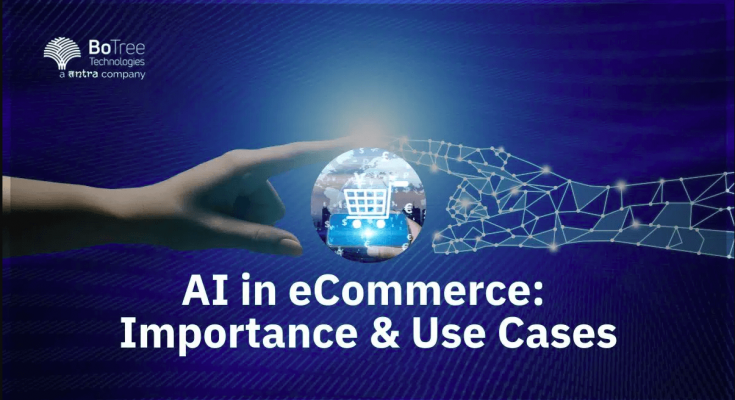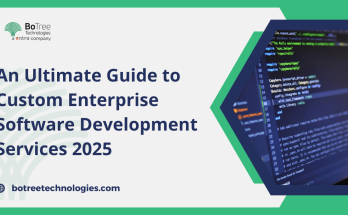eCommerce has become one of the most important parts of the global retail system. With the advent of the internet, many sectors of the economy have seen a massive change. The retail landscape has undergone a massive transformation as well. From AI in ecommerce to IoT, the industry is witnessing multiple innovations coming to the forefront.
The ongoing digitization of the lifestyle of consumers catalyzed by the recent pandemics and lockdowns has shifted many consumers to online stores. In 2021, the global eCommerce was approximately 4.9 trillion U.S. dollars. The figure is forecasted to rocket towards 7.4 trillion dollars by 2025.
We can say for sure that eCommerce is here to stay. In fact, it will continue to grow and gain an even larger market share in the future. However, as it continues to spread its wings, the basic expectations of online retail consumers are evolving. eCommerce companies are also seeking mechanisms to improve their consumer experience. AI in E-commerce comes into play here.
Artificial Intelligence is quickly becoming an essential part of our lives. The eCommerce industry is no different. The applications of AI in eCommerce are massive. It helps to deliver an outstanding customer and user experience in eCommerce and make informed business decisions by using customer data.
There are many eCommerce companies that are trying to gain a greater share of the market. What can set apart an eCommerce business from others is the focus on customer satisfaction. Consumers are likely to go back to the platform, which simplifies their shopping and grievance redressal experience.
AI Personalization in eCommerce can be of great help here. With AI-embedded solutions such as chatbots, eCommerce companies can create human-like interfaces where customers can interact and get what they need.
AI should definitely be adopted by online retailers to ensure outstanding customer and user experience in eCommerce and make informed business decisions by using customer data. The blog explains how you can utilize AI to provide the best customer experience to your clients.
Importance of Artificial Intelligence in eCommerce
- Target Marketing and Advertising:
- Personalization is the key to success. Yet only 15% of online retailers confirm that they implement personalization.
- AI and machine learning in eCommerce has enabled the deep analysis of customer data, such as past purchase records. This helps to zero in on what your customers really want and accordingly prepare content that resonates with them.
- Automation:
- Artificial Intelligence in eCommerce helps the business to automate activities like synchronizing sales, identifying high-risk transactions, offering discounts to regular customers, and more.
- Automation can help the eCommerce business to automate repetitive tasks to simplify the front and back-end workflow. Automation of customer support leads to saving time and money and better customer satisfaction.
- Efficiency of Sales Funnel:
- Different eCommerce AI tools can be used to keep track of the sales funnel. AI services can be used here to gather customers’ data, automate the follow-up of abandoned carts, personalization of content, and more.
- Features like AI chatbots can help eCommerce businesses to help customers with their questions and thus help them complete the sale.
- Potential of Remarketing:
- It is more like a marketing technique that can be used by an eCommerce brand to send reminders to the target customers. The strategy aims to attract users who are already your customers.
- These customers might have already bought from you in the past, or they might have left before completing a purchase. AI computer vision can help eCommerce to analyze the behavioral pattern of every customer on the basis of sales generated and the most viewed or purchased items.
- Smart Search:
- Many customers use the search bar on eCommerce applications or websites to search for relevant products. However, seldom are the buyers not able to find what they are looking for. This disrupts the seamless customer experience and affects retention.
- Smart Search or Searchandizing is a new term in the industry. It is a mix of search and merchandising. It is concerned with using the search panel to look for a specific product.
- AI-enabled Searchandizing helps customers with navigation, autocomplete, recommended product listings, and more. In addition, eCommerce platforms use image annotation to offer personalized, user-friendly, and valuable search experiences through behavioral data analysis.
Use Cases of Artificial Intelligence in eCommerce
A Business Insider study reveals that 85% of customer interactions will be managed without a human by as soon as 2020. Many eCommerce businesses are already using AI to improve their customer experience. AI tools are helping companies not only better manage the consumer’s expectations but also conduct better analyses of customer data to make informed decisions.
Let us have a look at some of the use cases of AI in ecommerce.
- Personalized Product Recommendation:
- The impact of AI in eCommerce is immense, especially when it comes to making the best use of customer data. The AI/ML tools can be used to analyze vast data to understand customers buying behavior.
- This knowledge can help eCommerce companies to better the online shopping experience of customers by recommending the right products to them at the right time.
- Websites sometimes recommend the products that you might like on the basis of past purchases. Online retailers use ML and AI applications for eCommerce to capture data, analyze it, and use it to deliver a personalized experience, implement a marketing campaign, optimize pricing, and generate customer insights.
- Customer Service:
- AI-enabled digital assistants are helping to set up virtual assistants and chatbot technology. With this, eCommerce companies are delivering a higher degree of personal touch during customer support.
- These self-reliant bots can facilitate simple transactions, leaving live support agents able to focus on more complex issues. Virtual agents also have the advantage of being available 24/7. This allows the low-level questions and issues to be addressed at any time of the day without making your customer wait.
- Integration of Household Items:
- You have heard of smartphones, but have you heard of smart refrigerators? Big brands have taken a leap into smart consumer appliances. AI-powered solutions are transforming the E-commerce industry – Amazon’s Alexa and LG’s Smart InstaView refrigerator are examples of that.
- The refrigerator has a big screen with a virtual assistant. The assistant can help you to take stock of your groceries and help you order them from your nearby eCommerce retailer. This is the future of eCommerce, where companies will have direct access to your home.
- Improved Recommendations for Customers:
- With the help of artificial intelligence in eCommerce industry, online retailers can efficiently scan through massive amounts of data to predict customer behavior and offer relevant and helpful recommendations to individual consumers even before they realize their needs.
- This level of intelligence and micro-management of each consumer’s needs and behavior is helping to create the difference between a good brand and the best eCommerce brand.
- Better Logistics Management:
- The predictive power of AI-enabled inventory management systems is helping eCommerce brands to forecast the demand for a product, transit time of goods, and shipment delays.
- Smart logistics or intelligent logistics is basically all about being able to use real-time information via sensors, RFID tags, etc., for improved inventory management.
Conclusion
The impact of AI in eCommerce is massive. AI is constantly reshaping the eCommerce industry. It has changed the way eCommerce stores features and sells products to their customers. With the help of chatbots and virtual assistants, AI has a personalized shopping experience.
The technology is also helping companies to analyze the past buying behavior of the customers and utilize this knowledge to engage and retarget the customers in a particular way. The future of artificial intelligence in eCommerce is going to be more about perfecting the art of behavior analyses. Better AI prediction models for the future and smart appliances will bring another revolution in the retail industry.
BoTree Technologies is a leading software development company. We specialize in developing innovative AI applications for eCommerce.
Frequently Asked Questions
- What are the components of Artificial Intelligence?
Artificial Intelligence comprises data mining, natural language processing, and machine learning.
- Data Mining – It refers to the collection of both current and historical data to make accurate predictions.
- Natural Language Processing – It focuses on human-computer interaction and how computers interpret Natural Human Language.
- Machine Learning – It is concerned with the usage of a collection of algorithms to apply past experience or provide examples to solve an issue.
- What are some of the benefits of using AI in ecommerce?
Using the capabilities of AI in E-commerce can help your online retail business to make efficient usage of customer data and subsequently use it for target marketing, remarketing, increased customer retention, back office automation, and more.



